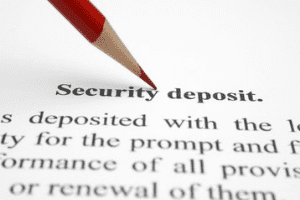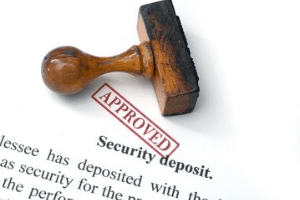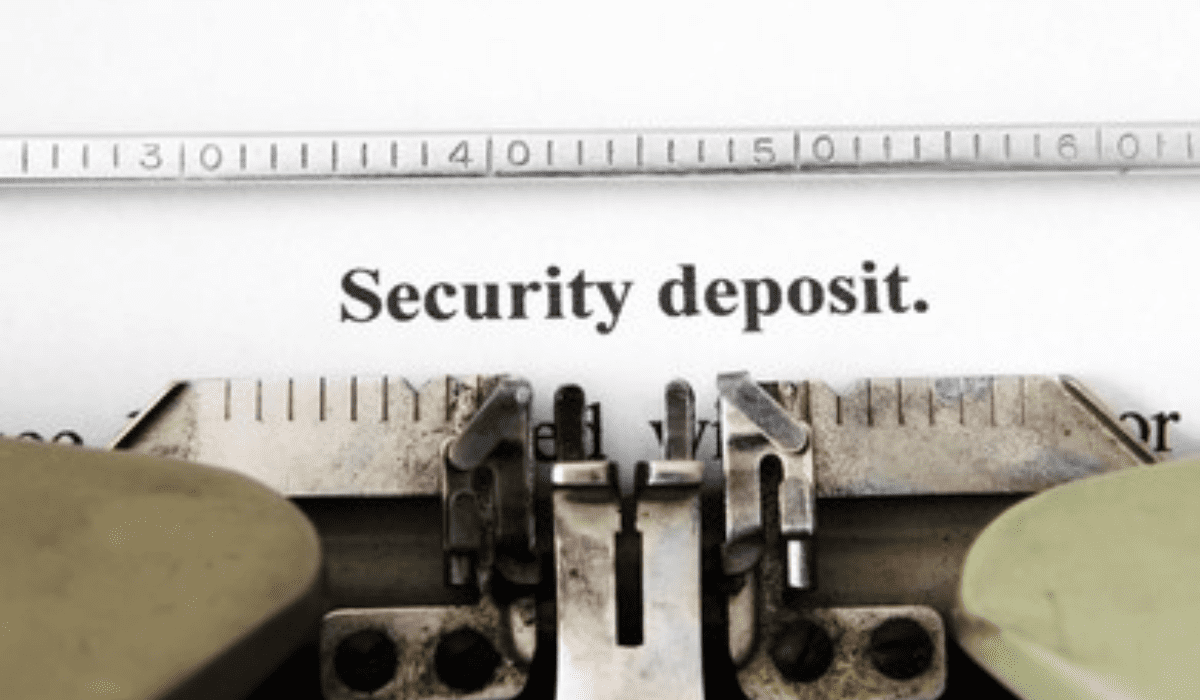When renting a property, tenants typically pay a security deposit to the landlord as a form of financial assurance. This deposit safeguards the landlord against potential damages, unpaid rent, or breach of contract. However, at the end of the tenancy, tenants often face challenges in retrieving their full security deposit due to misunderstandings or disagreements. Knowing your rights and responsibilities, as well as the correct steps to follow, can make the process of recovering your deposit smooth and stress-free. This guide outlines essential steps to help you ensure a hassle-free return of your security deposit.

What is a security deposit?
A security deposit is an upfront payment made by a tenant to a landlord at the beginning of a rental agreement. This amount, which typically ranges from one to three months’ rent in India, acts as a safety net for landlords to cover possible property damages, unpaid dues, or other expenses arising from tenancy breaches. Security deposits are refundable under the condition that the tenant abides by the lease terms and leaves the property in a well-maintained state. The amount and terms of the deposit should be clearly mentioned in the rental agreement, setting expectations for both parties.
Is a security deposit refundable?
Yes, a security deposit is refundable, provided that the tenant meets the conditions outlined in the rental agreement. The full amount should be returned to the tenant at the end of the lease term, assuming there is no damage to the property, unpaid rent, or other pending dues. The refund process varies, but typically, if the property is in good condition and all financial obligations are settled, the landlord must return the deposit within a reasonable time. Any deductions should be permissible, documented, and transparently communicated to the tenant to avoid disputes.
Permissible deductions from a security deposit
Landlords are allowed to make certain deductions from the security deposit, but these must be justifiable and in line with the rental agreement. Common permissible deductions include:
- Property repairs: Costs to repair any damage beyond normal wear and tear, such as broken fixtures, holes in walls, or stained flooring.
- Unpaid utility bills: Any outstanding water, electricity, or gas bills left unpaid by the tenant can be deducted.
- Cleaning charges: If the property requires deep cleaning beyond regular upkeep, landlords may deduct reasonable cleaning fees.
- Unpaid rent: If the tenant leaves without clearing the rent dues, the landlord can deduct the unpaid amount from the deposit.
Security deposit laws in India
The Model Tenancy Act (MTA) 2021 aims to address key issues within India’s rental housing sector. According to the Act, tenants are required to pay a security deposit in advance, with a cap of two months’ rent for residential properties and six months for commercial properties. However, this rule isn’t consistently followed in high-cost cities like Bangalore and Mumbai, where rental practices often deviate from the Act due to the elevated cost of living. As per the Act:
- Landlords have the right to deduct any outstanding rent or costs to repair intentional property damage from the security deposit before returning the balance to the tenant upon vacating the property.
- Security deposit refunds aren’t applicable in cases where the rent agreement is renewed; they are only refunded once the tenant decides to vacate after the rental period ends.
- Landlords should return the security deposit on the day of vacating or within 15 days of repossessing the property.
- Should the landlord delay the refund, they are required by law to pay simple interest on the amount owed to the tenant.
How to get your security deposit back from the landlord?
Follow these steps to get your security deposit back from your landlord:
1. Documents the property’s condition at the time of moving in
When you first move into a rental property, take detailed notes on the condition of each room and document any pre-existing issues, like damages, stains, or worn-out fixtures. Capture clear photos and videos of the property as visual proof to establish its initial state. Share these images and notes with your landlord, ideally via email or a written document, to create a record of the property’s condition at the beginning of your tenancy. This documentation will help protect you from being charged for damages that existed prior to your occupancy when it’s time to claim your security deposit back.
2. Prepare for moving out in advance
Start planning well before your move-out date to ensure a smooth transition and full return of your security deposit. Begin by reviewing the terms of your rental agreement, especially any clauses related to maintenance, cleaning, and handover expectations. Make a checklist of items that need to be addressed, such as minor repairs, thorough cleaning, and clearing out personal belongings. If your landlord has specified any particular standards for the condition of the property upon exit, aim to meet those requirements. This proactive approach minimises deductions from your deposit and shows your commitment to leaving the property in good shape.
3. Conduct a final joint inspection
A joint inspection with the landlord is crucial for documenting the property’s condition and addressing any concerns before leaving. Schedule a walkthrough a few days before the move-out date, allowing time to resolve minor issues if needed. During the inspection, go room by room, noting any wear and tear or areas the landlord may raise. Ensure you both agree on the property’s state, and request the landlord’s confirmation in writing. This joint inspection helps avoid unexpected claims later, increasing your chances of receiving the full security deposit.
4. Clear any pending dues
Before moving out, ensure that all outstanding payments, including utility bills, maintenance charges, and rent, are fully settled. Gather receipts as proof of payment and share them with the landlord if required. Clearing dues shows your responsibility as a tenant and prevents the landlord from deducting unpaid charges from your security deposit. Confirming that no payments are left unsettled smooths the process of recovering your deposit, minimising any potential disputes over financial obligations.
5. Address any necessary repairs or cleaning
Before vacating, inspect the property for any wear and tear or minor damage you might have caused during your stay. Repairing or addressing these issues yourself is often more cost-effective and avoids deductions from your security deposit. Focus on areas like wall scuffs, plumbing leaks, or broken fixtures, and consider hiring a cleaning service to leave the space in a move-in-ready condition. Taking these steps shows respect for the property and gives the landlord fewer reasons to withhold any part of your deposit.
6. Return the keys
Ensure that you return all keys and any other items provided by the landlord. Make a checklist to ensure you don’t miss anything, and hand them over during the final inspection. It’s important to return these items promptly, as failure to do so could result in deductions from your security deposit for replacement or rekeying costs. You may also want to request a receipt confirming the return of these items for your records.
7. Request a written settlement statement
After completing the final inspection and returning all keys, request a written settlement statement from the landlord. This document should outline the agreed-upon deductions, if any, and confirm the remaining amount of the security deposit to be refunded. A written statement provides clarity on the financial settlement and can help avoid future disputes. Ensure that both you and the landlord sign the statement, keeping a copy for your records. This step is crucial for ensuring that both parties are on the same page regarding the security deposit refund.
8. Follow up politely and professionally
If the security deposit has not been refunded within the agreed time frame, it’s important to follow up politely and professionally. Contact the landlord via email or phone, reminding them of the agreed-upon refund date and requesting an update. Maintain a courteous tone, as maintaining a positive relationship can help in resolving the matter quickly. Keep a record of all communication, as this could be useful if further action is needed.
9. Don’t leave the property before you get your money
Many tenants lose patience in requesting their security deposit and leave their homes hoping the refund will come later. However, this approach often leads to delays and complications in getting the deposit back. It’s much easier to secure your deposit while you’re still occupying the property. If your rental agreement specifies that the deposit will only be refunded after you vacate, this may not apply to you. In such cases, make sure to have photographic evidence that the property was in good condition when you moved out. Without this, the landlord may claim damages that could delay or reduce your refund.
What to do if the landlord refuses to refund the security deposit?
If your landlord refuses to return your security deposit, here are some steps you can take:
Consult a lawyer
If your landlord refuses to return your security deposit, the first step is to consult a lawyer who specialises in property or tenancy laws. A lawyer can assess your situation, review your rental agreement, and advise you on the best course of action. They will help you understand your legal rights and whether the landlord’s actions are justified.
Issue a legal notice
If the landlord continues to withhold your security deposit despite your efforts, issuing a legal notice is an effective next step. A legal notice serves as a formal communication, outlining your claim and demanding the return of the deposit within a specific time frame. This notice can be drafted by your lawyer and should mention the details of your tenancy, the security deposit amount, and the relevant laws protecting tenants. The threat of legal action often prompts landlords to settle the matter quickly, as they may wish to avoid lengthy legal proceedings.
Gather all the necessary documents
When pursuing the return of your security deposit, it is crucial to gather all necessary documents to support your claim. Key documents include your rental agreement, which outlines the terms of the security deposit, receipts for the deposit payment, and any correspondence with the landlord regarding the deposit. Additionally, if there were any damages or repairs made, keep records, such as photos or repair bills, to show the property’s condition at the time you vacated. Having these documents organised and ready will strengthen your case, whether you proceed with legal action or negotiation.
Consider Alternative Dispute Resolution
If the landlord refuses to return your security deposit, consider pursuing Alternative Dispute Resolution (ADR) methods, such as mediation or arbitration, before taking legal action. ADR can be a quicker and more cost-effective way to resolve disputes. In mediation, a neutral third party helps facilitate a conversation between you and the landlord to reach a mutually agreeable solution. Arbitration involves a third-party arbitrator who listens to both sides and makes a binding decision. ADR allows for a more amicable resolution and may save you the time and expense of going to court.
File a case in the civil court
If all other attempts to recover your security deposit fail, you have the option to file a case in the civil court. This should be considered as a last resort, as the legal process can be time-consuming and expensive. To file a case, you’ll need to submit a petition with the appropriate court, outlining the details of the dispute and supporting evidence, such as the rental agreement, communication with the landlord, and proof of property condition. The court will review the case and issue a ruling. However, this step may take several months or even years, depending on the complexity of the case.
Use the N.I. Act
Under the Negotiable Instruments Act (N.I. Act), if your landlord issues a cheque or any other negotiable instrument for the security deposit refund that bounces, you can take legal action. The N.I. Act allows you to file a case for dishonour of a cheque. You can initiate legal proceedings by sending a demand notice to the landlord within 30 days of the cheque bouncing. If the landlord fails to make payment within 15 days of receiving the notice, you can file a case in the court. This process provides a more streamlined legal approach for recovering dues linked to bounced cheques, but it applies only if the landlord has issued a cheque that failed to clear.
Getting your security deposit back: Common mistakes to avoid
When attempting to get your security deposit back, it’s important to be aware of and avoid common pitfalls that can delay or even prevent a successful refund. Here are some key things to keep in mind:
- Not documenting property condition: Failing to document the condition of the property at the time of move-in can make it harder to prove the property’s state when you move out. Always take photos or videos when you move in and when you vacate to avoid disputes.
- Skipping repairs or cleaning: Leaving behind any damages or neglecting to clean the property could lead to deductions from your deposit. Address any minor repairs or cleaning required before vacating to ensure the property is in good condition.
- Not settling outstanding dues: Ensure all rent and utility bills are paid up to date before you vacate. Unpaid dues are a common reason landlords may withhold your security deposit.
- Leaving without proper notice: If your rental agreement specifies a notice period for vacating, make sure you follow it. Failure to do so could result in deductions or delays in receiving your deposit.
- Not following up regularly: If the landlord is delaying the refund, don’t hesitate to follow up. Polite, consistent communication can help resolve the matter faster and prevent unnecessary complications.
- Ignoring legal rights: Be informed about your legal rights under Indian tenancy laws. If you face issues with refunding your security deposit, consider the legal steps such as issuing a legal notice or consulting a lawyer.

Tips for negotiating the security deposit terms before moving in
Discussing and clarifying security deposit terms upfront can save you from disputes and financial losses at the end of your tenancy. Here are some key points to cover during the negotiation:
- Put everything in writing: Ensure the deposit amount, refund timeline, and conditions for deductions are clearly mentioned in the rental agreement.
- Request a payment receipt: Whether you pay via bank transfer, cheque, or cash, ask for a written acknowledgment or receipt of the deposit.
- Negotiate a fair amount: Try to limit the deposit to two months’ rent, especially in states where the Model Tenancy Act is being implemented. Use factors like lease length or advance rent as leverage.
- Set a clear refund timeline: Propose a refund period of 7–15 days after vacating and include it in the agreement to avoid delays.
- Define ‘normal wear and tear’: Ask the landlord to specify what counts as acceptable wear (e.g., faded paint, minor scuffs) to avoid unfair deductions later.
- Demand itemised deductions: Clarify that any deduction must be justified with proof, such as receipts, bills, or photos.
- Agree on a joint inspection: Include a clause for a final walkthrough with the landlord before handover, so both parties can mutually verify the property’s condition.
- Add an interest clause (if possible): Suggest including a clause that mandates simple interest on delayed refunds, giving landlords an incentive to settle dues promptly.
Housing.com POV
Getting your security deposit back from a landlord can be a smooth process if you are well-prepared and understand your rights and responsibilities as a tenant. By documenting the condition of the property at move-in, conducting a joint inspection before leaving, clearing any outstanding dues, and ensuring that the property is properly cleaned and maintained, you can significantly reduce the chances of disputes over the deposit. Additionally, staying informed about relevant laws, like the Model Tenancy Act, and maintaining open communication with your landlord can help ensure the timely return of your deposit. If disputes arise, remember that there are legal avenues, such as issuing a legal notice or pursuing Alternative Dispute Resolution (ADR), to resolve the issue. By avoiding common mistakes and following the correct procedures, you can increase your chances of getting your full security deposit back, ensuring a hassle-free end to your tenancy.
FAQs
What happens if my landlord refuses to return the deposit on time?
If a landlord delays the return of your security deposit, they are legally required to pay simple interest on the amount owed, as per the Model Tenancy Act.
Can a landlord charge for normal wear and tear?
No, landlords cannot charge tenants for normal wear and tear, such as faded paint or carpet wear. Only damage beyond regular usage can be deducted from the security deposit.
Can the security deposit be used for unpaid rent?
Yes, if the tenant leaves the property without paying rent, the landlord is legally allowed to deduct the unpaid rent amount from the security deposit before returning the balance.
Is a security deposit mandatory for renting a property?
While it’s standard practice, the Model Tenancy Act limits security deposits to two months' rent for residential properties. However, it is often a requirement to secure a rental agreement in most cases.
Can I negotiate the security deposit amount with the landlord?
Yes, tenants can negotiate the security deposit amount before signing the rental agreement, but it must align with local rental laws, which may cap the deposit amount depending on the location and type of property
| Got any questions or point of view on our article? We would love to hear from you. Write to our Editor-in-Chief Jhumur Ghosh at jhumur.ghosh1@housing.com |







